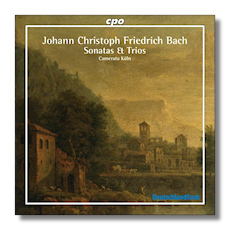
The Internet's Premier Classical Music Source
Related Links
- J.C.F. Bach Reviews
- Latest Reviews
- More Reviews
-
By Composer
-
Collections
DVD & Blu-ray
Books
Concert Reviews
Articles/Interviews
Software
Audio
Search Amazon
Recommended Links
Site News
 CD Review
CD Review
Johann Christoph Friedrich Bach

Chamber Music
- Trio in D Major for Pianoforte, Transverse Flute & Cello
- Sonata in A Major for Cello & Continuo
- Sonata in E minor for Transverse Flute, Viola & Continuo
- Sonata in G Major for Cello & Continuo
- Trio in G Major for Pianoforte, Violin & Viola
Camerata Köln
CPO 777087-2 DDD 66:58
Here's a likeable CD of chamber music by Johann Sebastian Bach's ninth son, and one of his four composer sons. Johann Christoph Friedrich Bach is less famous than his brothers Carl Philipp Emanuel, Johann Christian, and Wilhelm Friedemann, although it would be premature to say that he was less talented. Compared to his brothers, to say nothing of his father, J.C.F. Bach was a stay-at-home, whose professional life was limited largely to the court of Count Wilhelm of Schaumburg-Lippe in Bückeburg – hence the common appellation "the Bückeburg Bach." Much of his music was destroyed during World War Two, thus preventing a complete evaluation of his work. He appears to have kept himself busy in Bückeburg, though, not just as a composer but also as an instrumentalist.
The Count was an admirer of Italian culture, and so it is not surprising that there is an Italian influence in J.C.F. Bach's mature works. He was older than Mozart by more than two decades and outlived him by four years, so it also is not surprising that J.C.F. Bach's music bridges the Baroque and early Classical styles.
The Galant style was part of that bridge, and all of the works on this CD arguably are in that style. They are, above all, melodious, and they lack not just the structural complexity but also the profundity of his father's music. It is best not to compare J.C.F. Bach's music with that of his father or brothers, however. Judged on his own merits, he was a fine composer and still worth spending an hour with, now and then.
He is in excellent hands with Camerata Köln, outstanding performers of the Baroque and Classical repertoires since the late 1970s. These readings, dating from January 2004, embody the Camerata's usual virtues of imagination wedded to stylistic authenticity. Their colorful playing never gets bogged down in routine. Playing a prominent role on this CD are flutist Karl Kaiser and cellist Rainer Zipperling. Performing in the studios of German Radio, the musicians are well served by the engineering team, and Peter Wollny's booklet notes are as helpful as one could wish.
Copyright © 2008, Ray Tuttle




















